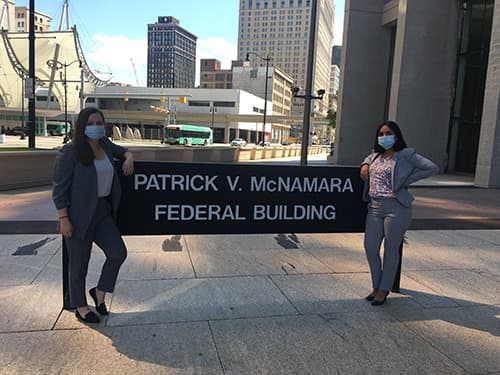Clinic Work During COVID-19: Immigration Law Clinic Secures Asylum for Client

On August 6, after months of work, briefing and gathering evidence, getting an expert, preparing the client, and conducting the trial – all with the added complication of a pandemic – 3Ls Leslie Vazquez and Olivia Rose Beale effectively secured asylum for their client in immigration court.
Their client, a Cuban native persecuted on account of his religious beliefs, had fled his country, forced to leave his wife and two children behind. As student clinicians for MSU Law’s Immigration Law Clinic, Vazquez was assigned to the case in February, and she paired up with Beale at the beginning of the summer to write the brief and prepare for trial.
Throughout their representation of the client, and over the course of his case’s progression through the court system, the unpredictability of COVID-19 had Vazquez and Beale questioning when, and how, they would see it through.
“We just never knew what was going to happen,” Vazquez said. “The final hearing in this case was originally scheduled for July and then it got moved to August, and even in August, Professor [Veronica] Thronson warned us it could get cancelled the day of.”
Adding to the uncertainty, information such as who the judge overseeing the case would be and whether the interpreter would be present in person or virtually weren’t confirmed until the week of the hearing. Even when the day finally came, the hearing, originally scheduled for 1pm, was moved to an earlier time slot due to unforeseen changes in the judge’s schedule. “It was just all the unknowns that made the case a lot more stressful,” she added, but they were ready.
Given safety measures and restrictions set in place due to COVID-19, Vazquez and Beale were offered options for how they could choose to appear in court – but there was only one that they would consider.
“It was important for me to show that despite everything else going on in the world, he had the clinic and the team there to represent him. Professor Thronson mentioned that we did have the option to appear telephonically, but we had been working on his case for half a year, and we could not professionally let him go and face the judge by himself,” Vazquez said. “I needed to be there.”
“Normally, during asylum trials, they can have their friends and family there, and he couldn’t with COVID and everything,” Beale said. “The only people who were allowed there was his counsel and the court personnel.”
That day, all together at the court in Detroit, the judge ruled in favor of their client and the government waived appeal, resulting in their client’s final grant of asylum.
“Needless to say, practicing law in the time of COVID-19 is very different, but it is doable,” Clinic Director Veronica Thronson said. “I am very proud of the services we continue to provide to our clients in need.”

